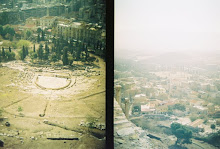Christmas 2008
I have come to realize that my confusion about interpretations, cultural and linguistic, stem from disconnects I saw a child. I was the kid always asking "why?" Not as in why can't I have a candy bar, but why does Saint Nicholas have black "elves" or slaves as a friend recently pointed out. But I never got answers because I was told to go "look it up," mind you this is preeeeee-internet. I didn't have the skills to find the answers on my own at that age. I might not have asked that particular question, as I had learned not to bother with difficult questions by that point (Saudi Arabia, age 4 - 6). Anyway, now I'm 33 and beginning to revisit those questions of my childhood.
It is a really fabulous thing to find yourself in a place where you look more in place than most places I've ever lived, yet don't have much direct access, cultural or language, to interact with my environment. Here I surprise people when I don't understand or speak the language. At home, maybe its the opposite. The first place I really called home is New York. Not because its the coolest city on earth, but because it's the first place I really feel at home. I have a sign I picked up at a garage sale that reads "Home is where the Heart is," which may have been why I thought to try and follow it here, but what I've found out is that my home is in my heart. It is where I am. Though now, having a place to call my own in Brooklyn, comforts me and is an extension of my heart, I am learning to feel at home where ever I am.
Chili is warming in the slow cooker. Friends coming for lunch and then heading out for a hike at the Fragrant Hills. Being in a place full of history has a similar effect as getting perspective from religion. It reminds you that life is big, much bigger than you and what you know. Its humbling, like nature. These institutions are all part of our culture. How we read, interpret, and understand these things. And we all do it a bit differently.
I met a man who grew up in Jerusalem last night. He is an architect. New to Beijing, he began to see similarities in the city structure and history to his home city. Being a holy site rather than a secular historic city as Beijing, but sharing things like an old city wall and then the expansion beyond. I'm not sure I understood all that he was trying to say, but I did recognize a familiar desire to try to interpret the new environment by comparing the similarities. For me, I am fascinated by the Beijing "er" and certain mandarin words that share a remarkable similarity to American slang and recent trend in rap music to pronounce word with an accentuated "er." I theorized that there was a connection through immigration of Chinese into urban crowded areas where young African Americans and Chinese mixed and new language was born out of being exposed to new sounds and opportunities of misinterpretation.
American Slang / Possible Chinese Origin
(in progress)
As a Christmas wish a friend asked for my top 5 fave books, so this is what I decided...not in any particular order:
1) Blink by Malcolm Gladwell
2) The Power of Place by Winifred Gallagher
3) Mr. Wilson's Cabinet of Wonder by Lawrence Weschler
4) The Companion Species Manifesto: Dogs, People, and Significant Otherness by Donna Haraway
5) Albertus Seba's Cabinet of Natural Curiosities (if picture books count, this is the most beautiful collection of diagrams of things in nature)
-












No comments:
Post a Comment